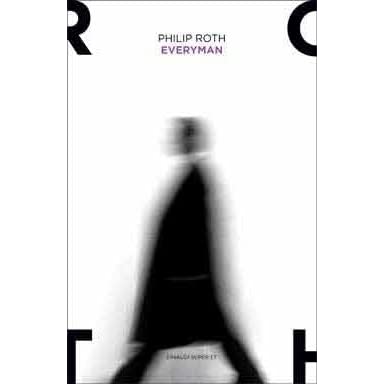Ph. Roth, Everyman (New York, Vintage, 2007 reprint).

Not everyone considers this book an unqualified success. Female critics in particular tend to look at the hero, whose name we never learn, as a philanderer with nothing but cunt in mind. One whose sole wish in life is to objectify women, fuck them, and finally dispose of them like so much soiled wastepaper. I, however have read it many times and am still reading parts of it practically every night.
Why? Not because of what it has to say about life in America, a problem to which I’ve devoted an entire book (which, however, being politically incorrect, only found a publisher in Russia). And not because it tells me much more about the nature of Jewish-American life than I’ve learnt from my Jewish-American friends over the last four decades or so. True, the hero is Jewish. So were his parents. Very decent, very supportive, New Jersey folks, buried in a Jewish cemetery where the hero himself will be buried soon enough. At one point in the book, hospitalized after an operation, he leaves the rubric “religion” on a form he is given empty. The reason? He does not want to attract the attention of some rabbi who, unasked, will visit him in his bed and talk “the way rabbis talk.” And the representatives of other religions too, I suppose. But because, as the book’s title tells us, it presents the reader with the story of everyman. Including myself, of course. It is my life over the last decade or so—I am seventy-six, only slightly order than Roth when he wrote this—that I am reading about.
The harsh sound of the sod covering one’s deceased parents’ wooden coffins. The tendency to forget any problems you may have had with them and remember only the good things. The slowly vanishing impression of most of the people, including the women, one has met during one’s life and used to associate with in one capacity or another. The slowly, but oh so painfully, evaporating illusions about one’s children from one’s first marriage whose love, once so strong as to encompass the entire universe, one has been unable to retain.
The slowly vanishing memories of times, long gone, when one was careless and free. In Roth’s case the apex of that freedom came at the age of ten when he was being carried towards the beach by the waves of the Atlantic. In mine, aged twenty or so, of running, barefoot and wearing only swimming trunks, for miles over the beaches north of Tel Aviv. A true miracle that: feeling, or perhaps ceasing to feel, one’s body function. Like God, or at any rate like some perfect machine operating in automatic mode. Without constraints, without any kind of aches, even without feeling tired. By now I am no longer capable of anything of the kind. Much worse, the beaches themselves, having been taken over by developers, have all but disappeared. What miserable stretches remain are too short and too crowded to allow for any serious running at all.
A topic on which Roth, master of brevity that he is, only spends one sentence: The gradual, often not so gradual, destruction of memory itself. Mainly, but not only, the kind known as short term. It is a strange process. One searches for something one knows is present in one’s head, but one cannot dig it out. A few minutes, or seconds, later one cannot even remember what it was that one wanted to remember. Suddenly it pops up again, often at the most unexpected moments and when it is no longer of any use. Or it does not. Each time, it is as if a part of oneself has gone missing.
The longing for the time before one’s biography became identical with one’s medical record (as Roth so aptly puts it). The decline of health, as reflected by the growing frequency of one’s visits to one’s doctor. As is also the case in Everyman, my doctor, as well as most of the other medical personnel one goes to, is friendly, generous with his time, and does his best; but when everything is said and done his powers are rather limited. The better he is, the readier he is to admit that fact.
The fairly constant humiliation of having to ask for help. In moving anything that is a bit heavy, as when my car blew a tire the other day. In working one’s computer, as I am doing right now (I could not run this blog without the assistance of my stepson, Jonathan Lewy). In finding one’s way. I particularly remember one rainy evening when, driving around in Tel Aviv, my glasses (I am near sighted) became clouded over. With them I could not see the street signs; without them I could not see the signs either.
The curious feeling that everything that matters happened long ago; in that sense, one is already dead. The fear, and the knowledge, that life is a one-way street that leads to—what?
Not-being, of course. Turning into a smelly mess with no memory and no consciousness. Most of these things, and many others beside, may be found in Roth’s slim masterpiece. May the critics say whatever they like: I on my part am going to read it again. And again. And again.
Except that having written this, I feel enough may finally be enough. Time to move on? But where to?
